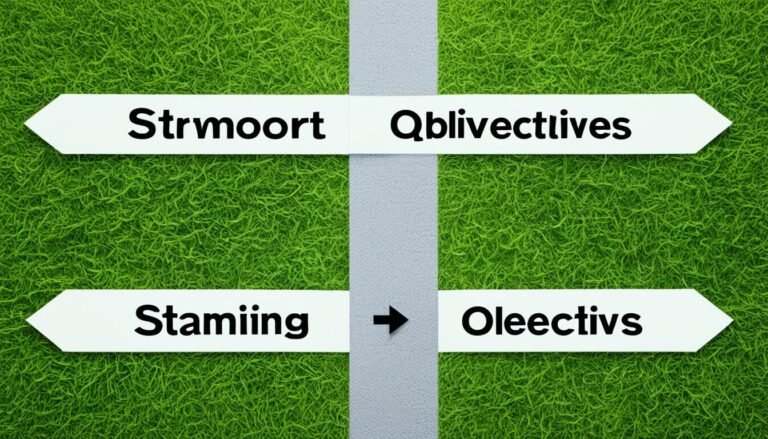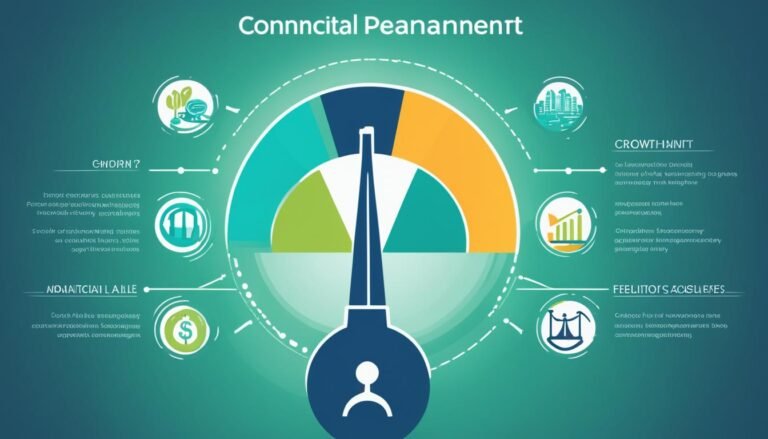How crucial is communication for effective management?
Did you know that 70% of workers feel stress because of poor communication? It’s true, effective communication is key to good management. It’s essential for creating trust, promoting teamwork, and reaching goals. Good communication is vital for leadership success, making teams more inspired and work better.
Key Takeaways:
- Effective communication is vital for effective management and leadership.
- Communication skills help build trust, foster collaboration, and achieve organizational goals.
- Ineffective communication can lead to workplace stress and decreased performance.
- Developing strong communication skills is crucial for successful management.
- Investing in communication training can enhance leadership abilities and drive team success.
Benefits of Strong Communication in Management
Good communication is key for any organization to succeed. When managers communicate well, everyone knows the goals. This helps employees feel happier, more confident, and proud of their work.
Clear talks from managers also inspire and energize teams. It makes work more efficient and fun, boosting overall quality. Staff feel important and connected through such talks.
With good comms, teams understand what the company faces and where it’s going. This understanding aids them in making smarter choices to help the business grow. It creates an open, friendly atmosphere where ideas easily flow, benefiting the whole team.
“Communication is the key to success in any organization. It builds trust, fosters collaboration, and enhances overall performance.”
Effective management communication shapes a happy work environment. Everyone feels part of the journey, which leads to more joy and high spirits at work. Happy staff are more likely to work better, making the whole team shine.
Proper communication ensures everyone knows what the company aims for. This shared vision gives a sense of direction and purpose, increasing employee loyalty.
Benefits of Strong Communication in Management:
- Increased employee awareness of goals
- Improved job satisfaction and morale
- Enhanced confidence among employees
- Promotion of efficiency and engagement
- Better overall work performance
- Opportunities for informed decision-making
- Establishment of an open and collaborative work environment
- Positive work culture
- Enhanced productivity and team performance
- Alignment with organization’s vision and mission
Good management communication brings many benefits. It helps both individuals and the whole organization do better. By focusing on communication, managers can build a great place to work and help reach big goals.
| Benefits of Strong Communication in Management |
|---|
| Increased employee awareness of goals |
| Improved job satisfaction and morale |
| Enhanced confidence among employees |
| Promotion of efficiency and engagement |
| Better overall work performance |
| Opportunities for informed decision-making |
| Establishment of an open and collaborative work environment |
| Positive work culture |
| Enhanced productivity and team performance |
| Alignment with organization’s vision and mission |
The Role of Clear Communication in Effective Management
Clear communication is vital for good management. It helps leaders share inspiring visions. It builds trust and teamwork towards goals. Techniques like being flexible, kind, open, and good listeners are key. They boost how leaders connect and inspire their teams. Plus, they make employees work better and feel more motivated.
Leaders who talk clearly and with a real goal reach their teams better. They adjust how they speak to reach everyone. This way, they resonate with different people. They make sure every team member feels understood and valued. This builds a strong sense of trust and care.
Being open is also crucial for good management. When leaders are honest, it encourages their teams to be honest, too. It creates a place where everyone feels safe to share. Talking openly also sets clear rules and makes everyone accountable. It makes sure everyone works towards the same aims.
“Effective communication is not just about what we say. It’s also about how we hear and reply. Listening well is crucial. It means we really focus on the speaker, trying to understand where they’re coming from. Then, we answer thoughtfully. This kind of talk gets everyone involved, shows respect, and starts teamwork.”
A work setting that supports and works together is key for management success. Good communication makes everyone aware of their work and the big goals. It aligns every person’s effort with the greater vision. This way, teams achieve common goals by working together.
Managers’ strong communication doesn’t just help inside the company; it also aids relationships outside. Talking clearly to clients and other partners builds faith and respect. It makes partnerships stronger. This improves deals and gives more chances for growth and success.
To sum up, clear talking is at the heart of great management. It lets leaders motivate and engage their teams. By using good communication tools, like being flexible, kind, open, and listening, managers create trust and teamwork. This makes the whole organization work better.
Leadership and Communication at Penn LPS Online
The Leadership and Communication focus at Penn LPS Online is built to enhance skills in these areas. It equips students with the tools to manage groups and communicate as professionals. The program blends real-world strategies, flexible thinking, and how to express yourself effectively.
Students can dive into key leadership and communication topics. This includes building unique leadership qualities, strengthening persuasive speaking, and using data to make decisions. They also learn about successful psychology themes and global leadership strategies.
The course mixes theory with hands-on practice. This lets students hone their leadership abilities. It empowers them to stand out in their careers as effective, confident leaders.
The Role of Communication Skills in Management
Good communication is key for any leader or manager. It allows them to share their goals, inspire their teams, and promote teamwork. At Penn LPS Online, students discover how to talk to different people in their organizations. This includes employees, clients, and other leaders.
Strong communication helps managers gain trust and motivate their teams. It lets leaders make their thoughts clear, reduce conflicts, and encourage open talks.
Students also learn to adjust their communication for various needs. They practice listening, showing they understand, and speaking openly with their colleagues. These skills help build strong connections and a positive workspace.
Effective Communication Techniques for Managers
This program arms students with powerful tools for communication needed by today’s managers. Techniques include:
- Active listening: Hearing out your peers, understanding their views, and reacting thoughtfully.
- Clarity and brevity: Sharing your ideas directly and in a way that’s easy to understand.
- Non-verbal communication: Knowing and using your body language, face expressions, and gestures can boost your words.
- Empathy: Putting yourself in others’ shoes to find common ground and improve how you work together.
- Adaptability: Changing how you communicate to fit different people and occasions.
Mastering these techniques helps students lead and communicate well in constantly changing settings.
Leadership and Communication Program
| Program Highlights | Benefits |
|---|---|
| Practical knowledge and critical thinking | Essential skills for leadership |
| Communication strategies for effective leadership | Better communication management |
| Exploration of key topics in positive psychology | Personal and professional growth support |
| Global leadership strategies | Prepares for leadership in a global market |
This program at Penn LPS Online readies students for modern leadership and communication challenges. Whether climbing the corporate ladder, leading teams, or making a difference in society, it prepares them well.
5 Skills to Enhance Leadership and Communication
To be a top leader and boost team communication, it’s vital to grow specific skills. These abilities help you do well as a boss and make a workplace that’s positive and strong. We’ll show you five must-have skills for better leadership and communication:
- Adaptability: Adapting means changing how you communicate to fit different people and situations. Leaders who can adapt listen to feedback and are open to new ideas. This helps them understand their team better and build trust.
- Empathy: Empathy is feeling what others feel. When you see things from your team’s perspective, you can communicate in a way that supports them. This makes them trust you more and strengthens your team.
- Transparency: Being transparent builds trust with your team. When you’re open and honest, your team feels safe to share their ideas and concerns. This trust leads to better teamwork and problem-solving.
- Active Listening: Active listening is more than hearing; it’s about showing you understand. When you really listen, your team feels valued and respected. This approach improves relationships and helps you make better decisions.
- Problem-Solving: Good leaders are good at solving problems together. They find the root cause of issues, work through challenges, and find the best solutions. Developing these skills helps you handle tough situations and conflicts.
Work on these skills to become a better leader and improve how your team works. Penn LPS Online has handy courses and real-life applications that can guide you. Tap into these resources to reach your leadership goals.

Better Employee Relations Through Effective Communication
Strong communication is key to good relationships at work. It helps build teamwork, lowers walls, and creates a friendly environment. With clear and effective communication strategies, leaders can see big improvements in how their team works together, their motivation, and the success of the business.
Good communication boosts how involved employees feel. When bosses talk clearly and in a way that’s easy to understand, it makes everyone feel safer. They feel their ideas matter and they’re more likely to give their all to meet company goals.
Also, talking right improves how well everyone gets along. When leaders speak to each team member in a way that really connects, it inspires them to do better. This personal touch helps create strong bonds between leaders and their teams, making work more like a team effort.
Telling everyone about the company’s goals and how they fit in is a must. It makes it clear what everyone is supposed to do, cutting out any confusion. This way, everyone knows they’re an important part of the big picture, boosting how hard they work.
Listening and talking about problems openly is also crucial. Doing this helps leaders spot and fix issues early. This kind of care can make employees feel more valued, building a stronger team spirit.
Creating a Positive Work Environment
A good work environment is vital for any company to thrive. Open and honest communication plays a big part in this. It builds a culture where everyone feels they’re heard, respected, and work together well.
Managers have many ways to achieve this positive environment. They can ask for input from the team, include them in decisions, and celebrate their wins. Doing so builds a happier and more productive workplace.
“Effective communication is not just about conveying information; it’s about building relationships, fostering collaboration, and creating a sense of belonging within the organization.” – Jennifer Thompson, HR Manager at ABC Company
Keeping everyone up to date on what’s happening in the company helps too. It shows how the team’s work fits into the bigger plan, which is motivating. Being open and sharing news builds trust and helps everyone feel part of the team.
Lastly, setting clear goals and giving good feedback are crucial. With clear directions and regular feedback, employees know what’s expected and how they’re doing. This guides them to do better, which makes them happier and the team stronger.
Overall, communicating well is a must for managers. It improves how the team works together and makes the workplace better. Good leadership through strong communication can really boost team spirit, motivation, and the company’s success.
Impact of Globalization on Communication in Management
Workplaces are getting more global and diverse. So, managers need good communication skills. They often lead teams with various cultures and languages. This makes it important for managers to know how to talk to everyone well.
Knowing different cultures is key to sharing company goals in a diverse workplace. It’s not just about language. It’s about connecting and understanding each other. This builds strong teams.
In today’s world, being a good communicator is crucial for managers. They need to make everyone feel included and respected. Here are tips for managers dealing with globalization:
- Being aware of different cultures and customs helps avoid misunderstandings. Learn about how people greet each other and their business manners.
- Making space for open dialog lets everyone talk freely. This helps get different ideas and viewpoints, making the team come up with better solutions.
- Listening carefully to what your team has to say is crucial. It shows that you value their perspective, which is key to building trust and stronger ties.
- Using tools like charts and body language can help when words fail. They make it easier for everyone to understand.
- Giving clear instructions and feedback helps keep everyone in sync. It clarifies what needs to be done and how to do it well.
Employing these techniques can help managers connect cultures. This leads to stronger teams working better together. This, in turn, boosts a company’s success.
Real-Life Example: Procter & Gamble
“At Procter & Gamble, being effective at how we communicate is crucial everywhere. We know the value of getting to know and communicate well with diverse teams. This creates a place where everyone feels they have a voice.”
– Sofia Rivera, HR Manager at Procter & Gamble
Multigenerational Relations and the Need for Effective Communication
Workplaces with people from many generations can be both tricky and rewarding. It’s key for managers to communicate well to connect everyone. This helps build good teamwork and makes the whole organization better.
Good communication makes work a better place. By not believing stereotypes and by welcoming everyone’s differences, work can be more fun and productive. Techniques like really listening and understanding others make respect between generations grow.
Also, good communication can stop fights and misunderstandings about age. Managers who help solve these problems make the team stronger and work goes better.
“Communication is the key to bridging the gap between generations in the workplace. Understanding and appreciating the diverse perspectives and experiences of different age groups allows us to create an environment where everyone feels valued and heard,” says Jane Patterson, HR Manager at ABC Company.
Creating talk and mixing different age groups makes a workplace better. This way, you get new ideas, happier employees, and everyone does better at their job.
Effective Communication Techniques for Managers in a Multigenerational Workplace
Managers can use these five good communication tips:
- Listening helps managers learn from employees of all ages and build strong bonds.
- Empathy means really getting the challenges and views of each group, which helps everyone understand each other better.
- Say things clearly and in simple words, so everyone knows what’s going on.
- Change how you talk to fit different age groups, making sure the message gets through to everyone.
- Always be ready to learn from everyone, no matter their age. This helps managers keep getting better.
With these tips, managers can make a place where everyone feels welcome. This leads to better work, more sharing of ideas, and happy employees.
| Generation | Communication Preferences |
|---|---|
| Baby Boomers | Prefer face-to-face and phone conversations |
| Generation X | Prefer a mix of in-person, phone, and email communication |
| Millennials | Prefer digital communication channels, such as email and instant messaging |
| Generation Z | Prefer instant messaging, social media, and video conferencing |
Knowing how different people want to talk can help managers reach out better. This makes teamwork and sharing ideas grow stronger.
Great communication is key for managing a team of many ages. By understanding each other, bridging generational gaps, and promoting teamwork, managers create a happy, working together space. Using good communication skills helps managers create a positive space for everyone, which boosts how well the team works, and the success of the organization.
Problem Solving Through Effective Communication
Managers need strong communication skills to solve workplace problems. They guide employees through difficulties by talking and listening well. This approach helps solve conflicts and improve team performance.
Active listening is a crucial part of problem-solving. When managers listen to their team’s worries, they get a better idea of what’s wrong. This approach lets them find the right solutions. It shows how important good communication is in leadership.
“Active listening is key to solving problems. It builds trust and helps find the real issues. Then, it’s easier to come up with fixes.”
Good communication also means really understanding the problem. By seeing things from their team’s point of view, managers can speak in ways that help. This makes the team feel they are truly part of the solution. It encourages working well together.
Solving problems this way builds trust with employees. They believe in a manager who listens and helps with care. This trust makes teams work better together and makes everyone more positive. This boosts the team’s success.
The Power of Effective Communication in Problem-Solving
Managers can do a lot by talking and listening well. They can set clear goals and make sure everyone understands. They help people work together and solve problems. They also encourage coming up with new and better ways to do things.
Using these strategies creates a better work environment. It helps teams feel motivated and do their best, which leads to the company doing well.
| Benefits of Problem Solving Through Effective Communication | Importance of Communication in Leadership |
|---|---|
| Improved problem-solving skills | Builds trust and rapport |
| More engaged and motivated employees | Encourages teamwork |
| Better decision-making | Helps spot and tackle challenges |
| A more positive workplace | Boosts morale and job happiness |
Effective communication is fundamental to good management. By talking and listening, managers build a team that creates new ideas and constantly improves. Teaching managers to communicate well is key to solving issues and making the company grow.
Conclusion
Good communication is key to being a successful leader. It helps build relationships, trust, and teamwork. Managers need to be good at adapting, listening, and solving problems.
Learning how to communicate better can make leaders stronger. This improves the team and the whole company. When managers communicate well, they help everyone understand the goals better. This makes work better for everyone.
Understanding how vital communication is can make work a better place. Managers who communicate well can share their ideas clearly and solve problems easily. With better communication, teams work together better and achieve more success.








